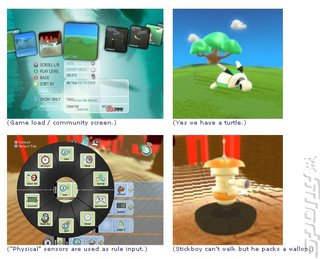Microsoft's Boku Stickboy versus LBP Sackboy has History
It's one of those overnight sensations.

Stickboy down in the lower right.
As if out of the blue Microsoft's side-project, Boku, aimed initially as an educational tool for kids (and replete with a Stickboy) has hit the headlines in the last few days... just as LittleBigPlanet is released.
Boku, according to Microsoft Research is, "...a new visual programming language made specifically for creating games. It is designed to be accessible for children and enjoyable for anyone. The programming environment runs on the XBox, allowing rapid design iteration using only a game controller for input."
Its key elements are:
* High level language incorporates real-world primitives: collision, color, vision
* Uses XBox 360 Game Controller for input - no keyboard required
* Runs on XBox 360 and PC
*Interactive terrain editor
* Bridge and path builder
* Terrain editor - create worlds of arbitrary shape and size
* 20 different characters with different abilities
*Built-in sharing and rating
Here is what Laura Foy over at on10net has to say about her first look, "Boku is currently in pre beta stage but it's still incredibly impressive. It's a video game designed to teach children how to program. It runs off an xbox 360 controller and has adorable animations to keep the kids interested- but it teaches REAL programming from coding to debugging.
The goal is to attract kids as young as 5 years old by exciting them about the concept and emotional experience of programming. If you have a kid (or perhaps are at the coding level of one) you're going to want to check out Boku!"
The thing is that, despite the recent uptake in 'Buko is LPB Beater' stories, Ms Foy's account comes from... March 2007.
And here is what Boku's principal program manager, Matthew MacLaurin, had to say in an interview again in 2007. " The community is the answer. If youíre stuck, go and surf what others have uploaded today. If you canít figure out how to make the motorcycle jump over the canyon, go and browse motorcycle and jump, and look, someone else did it. So you pull it down, and of course the codeís built in. Itís obvious I guess, but the Internet as an infrastructure for creative communities to come together ó thatís really what itís all about."
So, not such an overnight sensation as the Internet might be making out.
Boku, according to Microsoft Research is, "...a new visual programming language made specifically for creating games. It is designed to be accessible for children and enjoyable for anyone. The programming environment runs on the XBox, allowing rapid design iteration using only a game controller for input."
Its key elements are:
* High level language incorporates real-world primitives: collision, color, vision
* Uses XBox 360 Game Controller for input - no keyboard required
* Runs on XBox 360 and PC
*Interactive terrain editor
* Bridge and path builder
* Terrain editor - create worlds of arbitrary shape and size
* 20 different characters with different abilities
*Built-in sharing and rating
Here is what Laura Foy over at on10net has to say about her first look, "Boku is currently in pre beta stage but it's still incredibly impressive. It's a video game designed to teach children how to program. It runs off an xbox 360 controller and has adorable animations to keep the kids interested- but it teaches REAL programming from coding to debugging.
The goal is to attract kids as young as 5 years old by exciting them about the concept and emotional experience of programming. If you have a kid (or perhaps are at the coding level of one) you're going to want to check out Boku!"
The thing is that, despite the recent uptake in 'Buko is LPB Beater' stories, Ms Foy's account comes from... March 2007.
And here is what Boku's principal program manager, Matthew MacLaurin, had to say in an interview again in 2007. " The community is the answer. If youíre stuck, go and surf what others have uploaded today. If you canít figure out how to make the motorcycle jump over the canyon, go and browse motorcycle and jump, and look, someone else did it. So you pull it down, and of course the codeís built in. Itís obvious I guess, but the Internet as an infrastructure for creative communities to come together ó thatís really what itís all about."
So, not such an overnight sensation as the Internet might be making out.
Read More Like This
Comments
Didn't Microsoft's Greenberg promise that Banjo Kazooie Nuts & Bolts would have such great customisation it would be a LittleBigPlanet Killer?
Jimmy Reckon!
Jimmy Reckon!
Just seen the screenshots. My god it looks sh*t!
